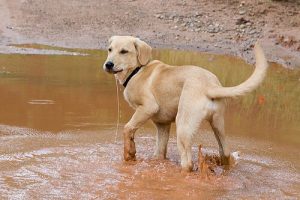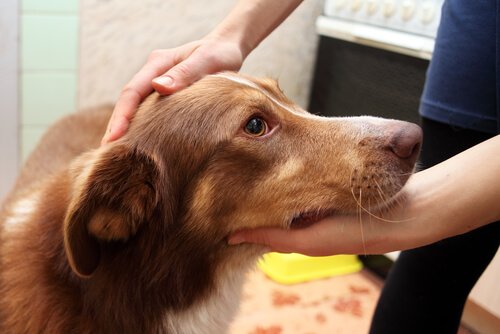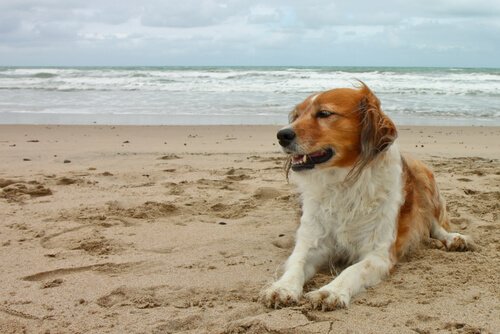Why Do Dogs Roll Around in Filth?

If you have a barking, four-legged friend, you’ve probably had noticed the following: at the moment you preocupied with some things, would notice your dog suddenly running back home from a grassy area with their fur dirty and stinky. They might have rolled around in some puddles, feces, or animal remains. In this article, you’ll find out why dogs roll around in filth.
Dogs rubbing against smelly things: a normal canine behavior

This behavior is completely normal and natural for dogs. The fact that you find it disgusting is your problem, not theirs. So, you shouldn’t punish them.
You should always keep in mind that your pet is a dog and not a human. These species are different from one another. Therefore, you shouldn’t fall into the temptation of humanizing them. You shouldn’t bother thinking that they will see things like you do.
Your dog will not hold a grudge against you for some of your behaviors that might seem strange to him. This includes things like putting on strong, odd smelling perfumes or colognes. So, why should you hold a grudge against him for the things he likes.
If your dog rubs against things that most people consider filthy, don’t worry because this is a completely normal behavior. So, instead of scolding him, try to understand the reasons for this behavior.
To understand dogs, you need to look at their ancestors, wolves.
According to animal behavior experts, there can be several reasons why animals roll around in filth.
First and foremost, you shouldn’t forget that dogs are descendants of wolves. Some dogs might not look like wolves, but they still have genetic remains of their ancestors. For instance, their hunting instincts.
A domesticated dog doesn’t need to hunt to get food. But they still have certain behaviors that are linked to hunting. This includes taking “prisoners”. These can be a ball, kitty cat, or a little bird.
The genetic background, one of the reasons why dogs roll around in filth
This hunting instinct is also inherited from wolves. Your dog will rub in places filled with trash, mud, and other things that you find offensive to look at and smell.
This is because all good hunters need to be unnoticeable. So, if they cover up their smell, they’re less likely to be detected by possible prey.
And the best way that wolves — and their descendants, our beloved pets — have found to ensure a good hunt is to cover themselves in stronger smells.
Also, getting rid of their smell also helps to protect them from potential predators.
Other reasons that dogs roll around in filth
Wolves also tend to rub against some places and things in order to leave a message to the rest of the pack. They do this with the smell they’ve covered themselves in. For instance:
- An area they found.
- A warning.
- A discovery.
However, rubbing against something can also have a different meaning. It could be a way to mark their territory. After all, animals have scent glands. So, they don’t just pick up other smells. They also leave theirs as a kind of signal. It says: “I was here first”.
These wolf-like behaviors also appear in dogs.
Humans are also guilty for our dogs rubbing in dirty places.

Beyond their genetic background, humans can contribute to pets rolling around in filth. This happens due to people trying to humanize their pets.
For example, if this behavior upsets you, it’ll upset you more if they dog it right after you’ve bathed and perfumed them.
It might be difficult to accept, but bathing your dog is the main reason why they take off running to roll around in filth. The soaps and shampoos you use to clean your precious dogs might smell good to you. But they might be very unpleasant for your dog.
So, be patient. Don’t get mad at your four-legged friend. Try to understand them next time. And, give them a shampoo that at the very least tolerable. This way, they won’t have to look for better smells to roll around in.
Main image photographer: Juan Luis Naranjo
If you have a barking, four-legged friend, you’ve probably had noticed the following: at the moment you preocupied with some things, would notice your dog suddenly running back home from a grassy area with their fur dirty and stinky. They might have rolled around in some puddles, feces, or animal remains. In this article, you’ll find out why dogs roll around in filth.
Dogs rubbing against smelly things: a normal canine behavior

This behavior is completely normal and natural for dogs. The fact that you find it disgusting is your problem, not theirs. So, you shouldn’t punish them.
You should always keep in mind that your pet is a dog and not a human. These species are different from one another. Therefore, you shouldn’t fall into the temptation of humanizing them. You shouldn’t bother thinking that they will see things like you do.
Your dog will not hold a grudge against you for some of your behaviors that might seem strange to him. This includes things like putting on strong, odd smelling perfumes or colognes. So, why should you hold a grudge against him for the things he likes.
If your dog rubs against things that most people consider filthy, don’t worry because this is a completely normal behavior. So, instead of scolding him, try to understand the reasons for this behavior.
To understand dogs, you need to look at their ancestors, wolves.
According to animal behavior experts, there can be several reasons why animals roll around in filth.
First and foremost, you shouldn’t forget that dogs are descendants of wolves. Some dogs might not look like wolves, but they still have genetic remains of their ancestors. For instance, their hunting instincts.
A domesticated dog doesn’t need to hunt to get food. But they still have certain behaviors that are linked to hunting. This includes taking “prisoners”. These can be a ball, kitty cat, or a little bird.
The genetic background, one of the reasons why dogs roll around in filth
This hunting instinct is also inherited from wolves. Your dog will rub in places filled with trash, mud, and other things that you find offensive to look at and smell.
This is because all good hunters need to be unnoticeable. So, if they cover up their smell, they’re less likely to be detected by possible prey.
And the best way that wolves — and their descendants, our beloved pets — have found to ensure a good hunt is to cover themselves in stronger smells.
Also, getting rid of their smell also helps to protect them from potential predators.
Other reasons that dogs roll around in filth
Wolves also tend to rub against some places and things in order to leave a message to the rest of the pack. They do this with the smell they’ve covered themselves in. For instance:
- An area they found.
- A warning.
- A discovery.
However, rubbing against something can also have a different meaning. It could be a way to mark their territory. After all, animals have scent glands. So, they don’t just pick up other smells. They also leave theirs as a kind of signal. It says: “I was here first”.
These wolf-like behaviors also appear in dogs.
Humans are also guilty for our dogs rubbing in dirty places.

Beyond their genetic background, humans can contribute to pets rolling around in filth. This happens due to people trying to humanize their pets.
For example, if this behavior upsets you, it’ll upset you more if they dog it right after you’ve bathed and perfumed them.
It might be difficult to accept, but bathing your dog is the main reason why they take off running to roll around in filth. The soaps and shampoos you use to clean your precious dogs might smell good to you. But they might be very unpleasant for your dog.
So, be patient. Don’t get mad at your four-legged friend. Try to understand them next time. And, give them a shampoo that at the very least tolerable. This way, they won’t have to look for better smells to roll around in.
Main image photographer: Juan Luis Naranjo
This text is provided for informational purposes only and does not replace consultation with a professional. If in doubt, consult your specialist.








